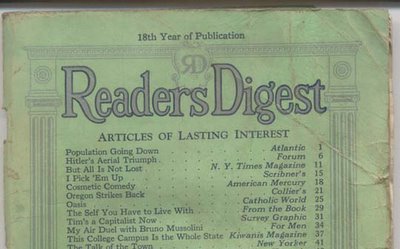A friend of mine recently had an e-mail exchange with a friend of his who happens to be a loyal Democrat, one who is so loyal he has often gotten himself into trouble by pointing out the idiotic self-defeating behavior of key party members and officials.
Democrat friend sent out a general e-mail with a link to Jim Hightower's recent column where he wrote,
"Where the hell are the Democrats," in which the former Texas congressman took his fellow Dems to task for not better opposing some of the shenanigans ongoing in Washington.
My friend's response: "The answer to Hightower's question is that they've changed their name to the Republican Party. The reason I lost my faith in the GOP is that they've adopted the big-government, we-know-better-than-you-do attitude with which the Dems ran Washington for the previous 40 years. I might quietly root for some Democratic victories for the sole purpose of creating gridlock - because a government that can't do anything is safer for us - but I have no illusions that either of these parties will do anything but make it worse once they have the reins." With that he provided a link to Claire Wolfe's "
O Little Town of Hardyville." Democratic friend's reply goes to the heart of my main concern about the libertarian philosophy, which my friend and I heartily embrace. "Well, I know you are a libertarian at heart, and if all men acted rationally, I would be right in there with you. I would agree with one thing: The Dems HAVE overreached on what government can and should do and they DO seem to like to micromanage. Still, I think the role for government is broader than libertarians claim, especially given that most times people do not act rationally. How much of that supposedly irrational behavior is in some kind of response to overreaching government is, to me, a question that all those who are in politics should take a hard look at."
My friend's response shows why I like the guy: "We're very alike and yet different. I agree: If all politicians and other government employees acted rationally, I'd be right there with you, too. I agree that all men don't act rationally, which is why I would prefer a system where the irrational are unable to centralize their power over the rest of us. The Bill of Rights is an extremely good start, but then we need a general agreement that we're going to live by those rules. We ain't."
Finally, Dem friend offers a reply that begs me to butt into the conversation and offer my two cents: "Sounds like you are searching or asking for a new or reinvigorated 'social contract.' Wow, big job. I think that takes a total collapse of the old one. I kind of think the Great Depression did that, and that was the start of our current contract. Like all contracts, it has gotten frayed and out of date. To an outside observer the next few years ought to be interesting. Of course if you are one of the lab rats in the great social experiment it looks different. I guess we shall see."
It's interesting when a discussion is boiled down to the brass tacks (pardon the ancient vernacular) - my friend and his Democratic buddy turn out to have a basic disagreement over what our "social contract" ought to be. The FDR-style Democrats believe that in the wake of the Depression, government made a commitment to take care of us. My friend (and I) believe we as members of the human race do have a "social contract" to take care of the truly needy, but that government of all human institutions is least equipped to handle the job. Its primary function is the use of force, and caring for the needy is a gentle job, one which requires personal and individualized attention, not the one-size-fits-all mentality and brutality of a central bureaucracy.
I, too, have often wondered if freedom and liberty can work in a world where most times people do not act rationally." A social contract where my right to do as I please extend only to the moment where my fist connects with your nose - that says our rights are absolute and nonnegotiable as long as we each don't infringe on anyone else's rights - assumes that the vast majority of us are reasonable and willing to abide by that contract. For example, Gandhi was able to succeed in throwing off British rule nonviolently because the British invaders were more "civilized" than, say, Hitler or Stalin's invaders would be.
But my friend is right when he points out that, yes, most times people do not act rationally, and government bureaucracies are comprised of people. Therefore the safest government is one bound by "social contract" to leave us the hell alone, one that does not have the power to interfere with us unless and until we infringe on someone else's rights.
Once upon a time the Constitution was considered to spell out the terms of that contract. Then we had leaders who were considered public servants (or perhaps, like all things that begin "Once upon a time," the idea that the Constitution once meant what it says is a fairy tale itself). Now (and perhaps for a long time before now) our leaders consider themselves our rulers, for whom the Constitution is an inconvenient "
goddamned piece of paper."
The time has long since come for free men and women to act as if the Constitution with its Bill of Rights is a contract that means exactly what it says. The rulers have done a good job of convincing many people that "Like all contracts, it has gotten frayed and out of date." But just like the Mark Twain quote I posted New Year's morning, just because something was written a very long time ago doesn't mean it isn't still brimming over with truth. It's time we stood up and said so.
 My humble predictions for tonight's State of the Union address:
My humble predictions for tonight's State of the Union address:













